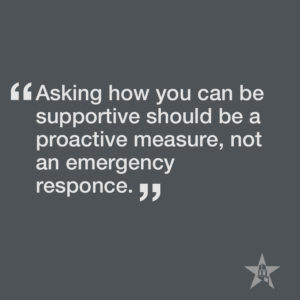Houghton College students are some of the most caring and well-meaning people that I have ever encountered. Here, we are encouraged to practice empathy and understanding when interacting with faculty, staff, and students. Although it may be uncomfortable, Houghton teaches students to practice empathy and understanding, and I think many students try hard to emulate that.
 When someone is mourning a tragic loss, a common empathetic response is “What can I do to help?” This often communicates to the person struggling that someone cares. Asking what you can do to help is a seemingly wonderful sentiment to offer. If you want to support someone, but are unsure of how to do that, it makes sense to ask. It’s a kind gesture, and if you actually listen to the response, you may have found valuable insight for the rest of your life.
When someone is mourning a tragic loss, a common empathetic response is “What can I do to help?” This often communicates to the person struggling that someone cares. Asking what you can do to help is a seemingly wonderful sentiment to offer. If you want to support someone, but are unsure of how to do that, it makes sense to ask. It’s a kind gesture, and if you actually listen to the response, you may have found valuable insight for the rest of your life.
I also hear this statement used when difficult situations occur that seem to especially affect our minority students. If you were on campus when a Houghton student received a racist note last spring, you may remember many people asking minority students, “What can I do to be helpful?” For many students, this was their way of caring and showing support. Many white students wanted to do something to help heal the wounds that minority students were feeling, but had no idea what would be the most helpful.
While the intentions behind this approach are kind, I want to caution people against using it as a method of support. For starters, when I heard about the incident of overt racism on our campus, I was distraught. As a human, I was disgusted. As a black man, I was both fearful and angry. I could hardly hold myself together in the days following the incident. When people would ask how they could be helpful, while I understood their kind intentions, it felt like I had this responsibility of educating my white peers on how to be empathetic while I was just struggling to make it through an entire shift at work.
I and many other minority students felt like we were being asked to lead the charge in social justice on campus when we were barely finding words to explain how we were feeling. We were already tired of trying to explain to people why they needed to listen to a chapel speaker who raised difficult topics about race the week before. Imagine how much more tired we were when we were constantly being asked to come up with helpful tips to empathize with us in our time of need.
 Another issue I have with this method of support is that it feels like my white peers haven’t actually been listening to either me or other minorities on campus. Don’t get me wrong, I know that people have good intentions when asking how they can help. However, I feel like we have been trying to teach campus how to be supportive for a long time. What happened to all of the panel discussions we’ve had regarding racial reconciliation? Did white students, faculty, and staff forget what we talked about, or were they simply not paying attention? In either case, it hurts knowing that these discussions haven’t really helped change anything.
Another issue I have with this method of support is that it feels like my white peers haven’t actually been listening to either me or other minorities on campus. Don’t get me wrong, I know that people have good intentions when asking how they can help. However, I feel like we have been trying to teach campus how to be supportive for a long time. What happened to all of the panel discussions we’ve had regarding racial reconciliation? Did white students, faculty, and staff forget what we talked about, or were they simply not paying attention? In either case, it hurts knowing that these discussions haven’t really helped change anything.
I’m not saying that white people should stop trying to find ways to support minorities. As a campus community, as the body of Christ, and as decent human beings, we should always be looking for ways to support one another. However, asking how you can be supportive should be a proactive measure, not an emergency response. If you find ways to be helpful, take note of that, and keep it in your memory for when it comes time for you to support someone.
Sometimes it’s not about what you say. Sometimes it’s about when you say it. This means that you may have to have difficult conversations before difficult situations arise. Even when you don’t see something tragic on the news or in your community, you may still need to engage in discussions about race. We need to be talking about race and how it impacts our culture, and how our diverse cultures make our experiences at Houghton different. If we have these tough conversations now rather than later, we will see instances of overt racism and have a better and more prepared response than “How can I help?”
Joe is a senior majoring in communication with a concentration in media arts and visual communication.
